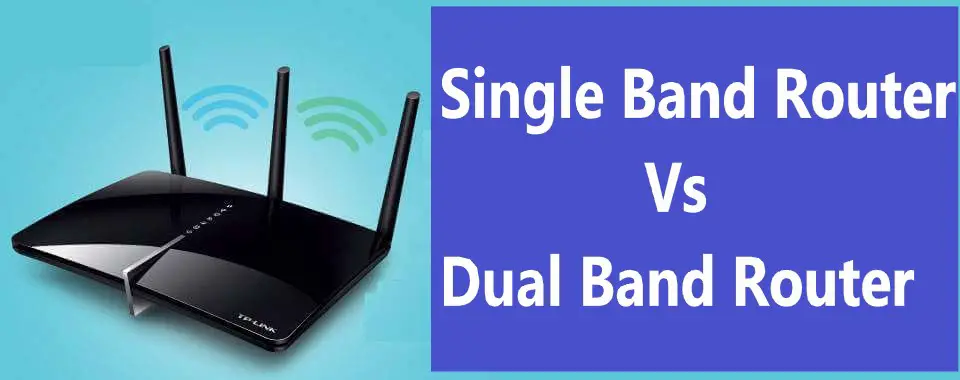Introduction
If you’re in the market for a router, you might be wondering whether you should get a single-band or dual-band router. Both of these routers have different features and limitations, and they operate in different ways. As a result, it is critical to understand the distinction between the two and how they function. Such inquiries will be addressed in this article. We will define single-band and dual-band routers and compare a single band vs dual band router.
Single Band Router
A single band router is a wireless router that transmits on one frequency band, typically the 2.4GHz band. Single band routers are also known as 2.4GHz routers. These routers are designed for small to medium-sized homes and typically have speeds of up to 300Mbps.
Single band routers are less expensive than dual band routers and are relatively simple to set up and use. However, they are more prone to interference from other wireless devices such as cordless phones and microwaves, because they operate on the same frequency band as other devices. Additionally, single band routers typically have slower speeds and a limited capacity for multiple high-bandwidth activities such as gaming and streaming.
Single band routers are compatible with most devices, but older devices may not support the 5GHz band of dual-band routers. They can be a good option for smaller homes or those with fewer devices and less demanding internet usage.
Dual Band Router
A dual band router is a wireless router that transmits on both the 2.4GHz and 5GHz frequency bands. These routers are designed for homes with heavy internet usage and multiple devices that need to connect to the network. They typically have speeds of up to 2.53Gbps and offer better performance for high-bandwidth activities such as gaming and streaming.
Dual band routers have improved network capacity, reducing the risk of interference from other wireless devices, such as cordless phones and microwaves, and offer faster speeds as they provide more bandwidth for data transmission. They are more expensive than single band routers and have more advanced features such as Quality of Service (QoS) and beamforming which may not be available in single band routers.
Dual band routers are compatible with most modern devices, but some older devices may not be able to connect to the 5GHz band. They are good options for households with heavy internet usage and multiple devices that need to connect to the network.
Single Band Router vs Dual band Router
A single band router transmits on one frequency band, typically the 2.4GHz band, while a dual band router transmits on both the 2.4GHz and 5GHz bands.
Pros of Single Band Router:
- Generally less expensive than dual band routers
- Simple to set up and use
Cons of Single Band Router:
- More prone to interference from other wireless devices
- Slower speeds
- Limited capacity for multiple high-bandwidth activities
Pros of Dual Band Router:
- Faster speeds and better performance for high-bandwidth activities such as gaming and streaming
- Reduced interference from other wireless devices
- Improved network capacity
Cons of Dual Band Router:
- More expensive than single band routers
- More complex to set up and use
- Some devices may not be able to connect to the 5GHz band.
In general, dual-band routers are better suited for homes with heavy internet usage and multiple devices that need to connect to the network. Single band routers are good for smaller homes or those with fewer devices and less demanding internet usage.
Differences Between Single Band And Dual Band Router
Single-band routers and dual-band routers have several key differences:
Frequency bands:
Single-band routers transmit on one frequency band, typically the 2.4GHz band, while dual-band routers transmit on both the 2.4GHz and 5GHz bands.
Speed:
Single-band routers typically have slower speeds compared to dual-band routers because they operate on a single frequency band. Dual-band routers can offer faster speeds as they provide more bandwidth for data transmission.
Interference:
Single-band routers are more prone to interference from other wireless devices such as cordless phones and microwaves because they operate on the same frequency band as other devices. Dual-band routers, on the other hand, have a reduced risk of interference as they operate on two different frequency bands.
Capacity:
Single-band routers have a limited capacity for multiple high-bandwidth activities such as gaming and streaming, while dual-band routers have improved network capacity.
Compatibility:
Single-band routers are compatible with most devices, but older devices may not support the 5GHz band of dual-band routers.
Cost:
Single-band routers are generally less expensive than dual-band routers.
Range:
Single band routers typically have a slightly longer range than dual-band routers.
Advanced Features:
Dual-band routers often have advanced features such as Quality of Service (QoS) and beamforming which may not be available in single band routers.
FAQS
What is the main difference between single band and dual band routers?
The main difference between single band and dual band routers is the frequency bands they operate on. Single band routers transmit on one frequency band, typically the 2.4GHz band, while dual band routers transmit on both the 2.4GHz and 5GHz bands.
Which is better for gaming and streaming, a single band or dual band router?
Dual band routers are generally better for gaming and streaming as they provide faster speeds and better performance for high-bandwidth activities.
Are single band routers less secure than dual band routers?
Not necessarily, both single band and dual band routers come with security features such as WPA/WPA2 encryption and firewalls.
Will a dual band router improve my internet speed?
A dual band router can improve your internet speed by providing more bandwidth for data transmission and reducing interference from other wireless devices.
Will a dual band router work with older devices?
Some older devices may not be able to connect to the 5GHz band of a dual band router. However, most modern devices are compatible with dual band routers.
Do single band routers have a longer range?
Generally, single band routers have a slightly longer range than dual band routers.
Can a dual-band router be used as a single-band router?
Yes, you can configure a dual-band router to only transmit on one frequency band, either 2.4GHz or 5GHz.
Q: Should I purchase a single band router or a dual band router? A: It depends on your specific needs and usage. Single band routers are good for smaller homes or those with fewer devices and less demanding internet usage. Dual-band routers are better suited for homes with heavy internet usage and multiple devices that need to connect to the network.
Conclusion
This article discusses single-band routers and dual-band routers. It also compares dual-band routers to single-band routers. The above factors will assist you in determining which router is best for you. Consider the tasks you typically perform on the internet, the number of people who will use the router, and the coverage you require. The coverage area is the area of your home or workplace. If you want to buy a single-band router, you can still find some high-quality ones that provide fast and secure internet. You must also research and compare brands before making any purchases.

